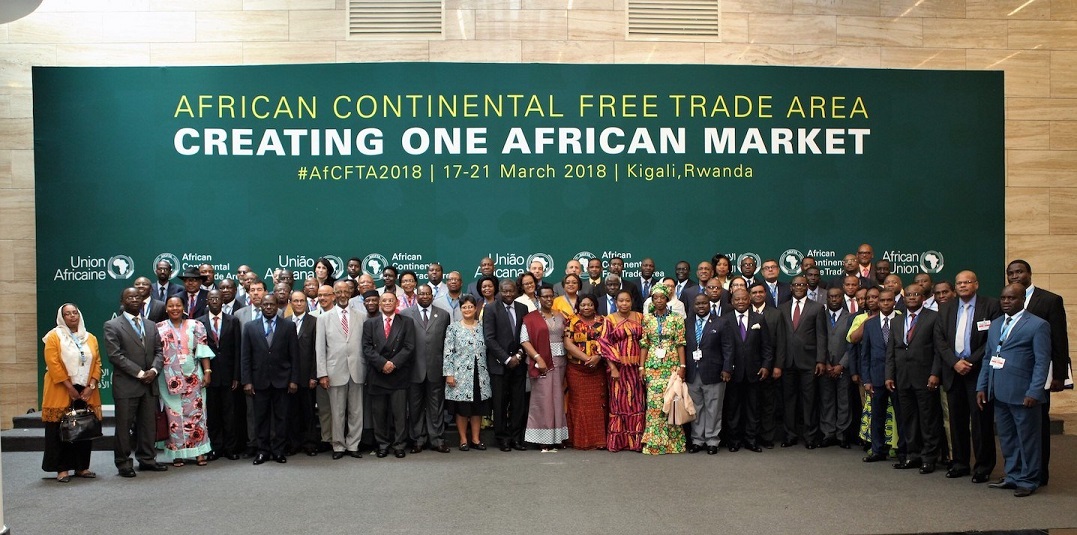44 African nations sign free trade pact
March 27, 2018 | Expert Insights

Forty-four African countries have signed a historic trade agreement aimed at liberalizing the movement of goods and services across the continent.
Background
Africa is known for its trade routes throughout history. North Africa was a central point for trade activities to the entire Mediterranean region. Outside of Egypt, trade was generally controlled by the Phoenicians who dominated North Africa. Much of the eastern trade was controlled by the Greeks, including along the Red Sea with Ethiopia.
The Egyptian city of Alexandria (founded by Alexander the Great in 334 BC) was known as one of the greatest hubs for Mediterranean trade for many centuries. Nubia in Sudan traded with interior African countries such as Chad and Libya, as well as with Egypt, China, India, and the Arabian Peninsula. For a large part of the 1st millennium AD, the Axumite Kingdom in Ethiopia and Eritrea had a powerful navy and trading links reaching as far as the Byzantine Empire and India. On the east coast, Swahili traders introduced the movement of goods through the Indian Ocean trading network, importing Chinese pottery and Indian fabrics in exchange for gold, ivory, and slaves. As a result, present-day Kenya, Tanzania, and Uganda became a prosperous trade empire.
However, trade was far more limited in interior Africa. Low population densities led to profitable commerce being difficult. The Congo rainforests created a massive barrier, blocking trade through the center of the continent. The arrival of the Islamic armies transformed the economies of much of Africa. This was largely because Arab expansion carried large amounts of trade across the desert by camel.
This expansion resulted in the development of a series of states across the southern parts of the Sahara. One of the first such states was the Kingdom of Ghana. Before long, others such as the Mali Empire and Kanem-Bornu, also came up in the region. These states mainly traded gold, which was plentiful in Guinea. By 1000, Zimbabwe and regions of Southern Africa developed widespread overseas trade across the globe.
Analysis
Forty-four African countries signed an agreement establishing a free trade area, highlighting the importance of the continent’s economic development. The African Continental Free Trade Area (AfCFTA) was signed during the 10th Ordinary Session of African Union Heads of State summit held in the Rwandan capital, Kigali.
The AfCFTA denotes the world’s largest free trade agreement since the inception of World Trade Organization in 1995. Nineteen presidents from across the continent were present, along with Prime Ministers and government representatives who signed for their respective countries.
“The agreement establishing the AfCFTA was signed by 44 countries,” said Moussa Faki Mahamat, chairperson of the AU commission. The creation of a free trade area comes after two years of negotiations, and is one of the AU’s flagship projects for further African integration.
The full list of countries that signed the agreement is not yet available. However, economic powerhouses such as South Africa, Kenya, Morocco, Egypt, Ethiopia, and Algeria, which are known for strict protectionist policies restricting imports and exports, signed the deal. On the other hand, Nigerian President Muhammadu Buhari refused to sign stating that he needed more time for consultations. Nigeria is one of the Africa’s largest markets. It received several objections from local business leaders and unions, indicating that the deal will need to pass through various national parliaments and may face several obstacles.
“Some countries have reservations and have not finalized their national consultations. But we shall have another summit in Mauritania in July where we expect countries with reservations to also sign,” said Albert Muchanga, the AU Commissioner for Trade and Industry.
It should be noted that if all 55 African Union members sign the agreement, it will create a bloc with a cumulative GDP of US$2.5 trillion and cover a market of 1.2 billion people. At present, African countries conduct only 16% of their business with each other. It is known to be the smallest amount of intra-regional trade compared to Latin America, Asia, North America, and Europe.
Assessment
Our assessment is that the signing of the AfCFTA would foster Africa’s re-industrialization process and strengthen their economies. Trade between African countries is extremely low. It accounts for only 10% of all commerce on the continent in comparison to 25% in Southeast Asia. We believe that Africa needs intra-trade rather than external aid and loans. While intra-African trade can bring economic benefits to member countries, there should be extensive consultation and participation to avoid the drawbacks of past trade agreements. The agreement is still to be ratified at a national level, and is only due to come into force in 180 days.








Comments